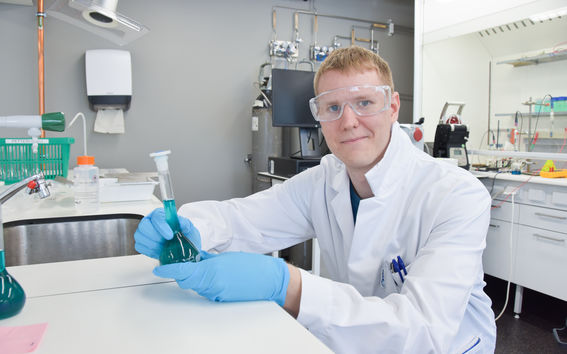Get to know us: Doctoral student Jere Partinen

What made you apply to Aalto University?
I was initially accepted to the old bachelor’s program of Materials Technology (Materiaalitekniikka) but enrolled as absent for the first year to go to the army. During that time, a couple of the old study programs were combined into a new one. This merged program is called the chemical engineering program, and so I started my studies in that one. The biggest reason for me to come to study at Aalto was my interest towards materials technology. It’s also a bachelor’s major now. My dad had studied in the former University of Technology and my cousin was also studying here at the time. These were also contributing factors to why I choose Aalto.
What is your current research topic?
So far, I have researched the recycling of lithium-ion batteries, specifically on leaching industrial lithium-ion battery waste. I’ve been working with Alexander Chernyaev from our HYDRO group, and we have primarily researched the effect of different reductive agents on the leaching. Our results provide new information for designing the leaching part of the recycling or for studying the phenomena related to the process.
Why did you want to continue your studies?
When I was doing my master’s studies, I was certain that I would go to work in the industry after graduating. I had not even considered doctoral studies as a real option for me. However, when I was working in the HYDRO group as a research assistant in the end of 2018 Mari Lundström approached me. She is working as the Assistant Professor of the HYDRO research group and asked me if I would like to continue as a doctoral student after graduating. Then, the thought was in the back of my head for a few months. Finally, I decided to take that offer. It just felt right for me in the end and I have not had any regrets.
Whats the difference between doctoral and master’s studies?
Doctoral studies differ a lot from my earlier studies. They are much closer to normal work compared to bachelor’s or master’s studies. I now have an employment contract with 8 hours of work a day, a boss, and a supervisor. The doctoral studies also include mandatory theoretical studies of 40 credits, and most of the courses are more demanding and require more work than what I have done before. After all, doctoral studies are one big, long project of getting your thesis done so treating it as a job seems appropriate.
What does a typical workday look like for you?
My typical workday consists of doing experiments and reading articles. There are also occasional meetings. On top of that, I am responsible for some safety-related tasks in the laboratory and updating our chemical inventory Excel. Something that came as a surprise for me once I started my doctoral studies was how much responsibility is involved in everything I do. For example, planning the experiments and writing applications are very much under your responsibility, even though your supervisor also gives comments and approves them.
What are helpful qualities for a researcher?
Resilience and the ability to handle stress because there are going to be setbacks along the way and deadlines can be stressful. Good communication skills are also beneficial because the doctoral study project involves a lot of discussions with your colleagues, supervisor and people outside of your own research group. The ability to plan ahead is an important skill and is a way to alleviate the stress.
What would be your advice to people interested in the doctoral studies?
Go for it! Be prepared to face difficulties but do not let them stop you. Believe in yourself and be open to learning new things. Putting a lot of effort into your master’s thesis is going to pay off by giving you valuable experience in reading and writing scientific literature. Moreover, getting a high grade helps you to get accepted into the doctorate program.
This interview is conducted by Aleksanteri Kupi who has been working during the summer at the School of Chemical Engineering.
Read more news

Kielibuusti Project 2025–2028 Supports International Students and Staff at Aalto University
The Kielibuusti enhances opportunities for international students and staff to learn and use the Finnish language, and it supports the multilingual working practices within the Aalto community.School of Business students Kuura Koivisto, Rosa Pohjolainen and Juulia Turkkila were members of the Finnish Olympic team
‘Finland and Aalto University had a great representation at the Winter Olympics again,’ says Professor of Practice Sami Itani
‘Our careers have been rewarding, and we want to help young people move forward’
After long careers abroad, Erkki and Kaija Rautiainen wanted to support the teaching and research in textile design and industrial engineering and management with a new fund.






